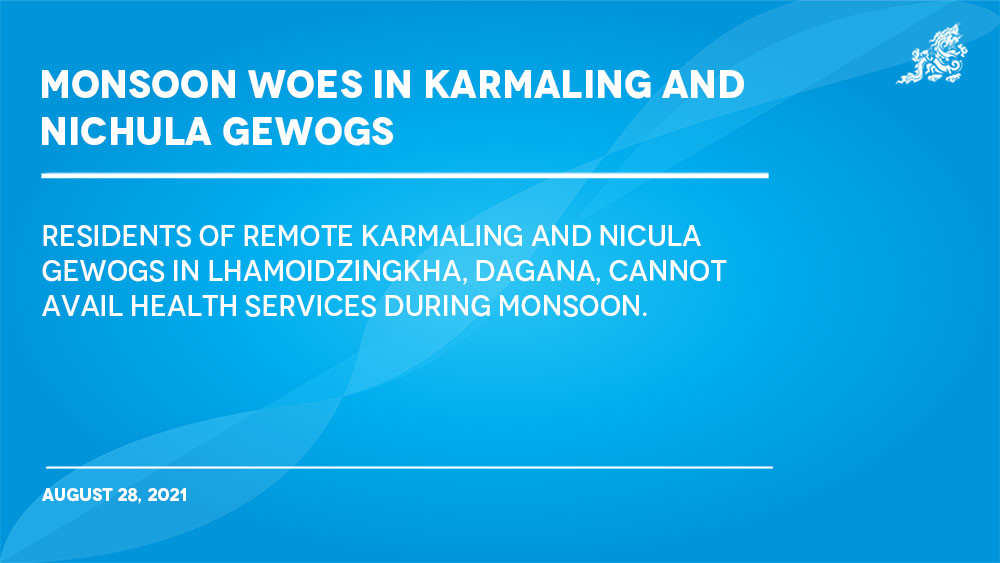Choki Wangmo| Dagana
Residents of remote Karmaling and Nicula gewogs in Lhamoidzingkha, Dagana, cannot avail health services during monsoon.
Without health workers in their gewogs and monsoon damaging road connectivity, people of these two gewogs have to live without access to proper health care services.
Nichula up Dilip Kumar Gurung, during the dzongkhag tshogdu (DT), conducted from August 17 and 18, raised the issue, and said that the gewog requires a health care worker in the gewog for three months in monsoon.
Nichula is one of the remote gewogs in the drungkhag.
In absence of a motorable bridge over the Sunkosh river, people have to depend on the 220m Hordung suspension bridge constructed in 2011.
According to gup Dilip Kumar Gurung, people cannot travel due to threats of natural disasters during monsoon. “Before 2011, people used to cross the river by boat.”
He said that inaccessibility to services have affected the vulnerable groups, especially the elders, children, and pregnant mothers.
A villager, Garjaman, said that it takes about four hours to travel to Lhamoidzingkha hospital, crossing three streams on the way that swells during monsoon. “It is difficult to travel in such conditions.”
He said that people have requested the gewog administration to have one health worker posted at the gewog during monsoon for a long time. “We are tired waiting for the concerned agencies to look into our request.”
Another villager, Nar Maya, said that with the gewog cut off for months during monsoon, people with chronic lifelong diseases suffered. “It is inconvenient.”
She said for people who have to conduct sugar level test for diabetes, they have to leave early morning without eating. “The journey becomes torturous when the journey is four hours long.”
People have to pay Nu 2,000 to make the journey back and forth to Lhamoidzingkha and Nichula.
Expecting mothers, she said, had to leave for Lhamoidzingkha one month prior to the delivery date. “Most of us come from low-income groups. Some have money to stay in hotels but many put up with the relatives.”
According to the gup, the gewog has an outreach clinic where health workers visit once a month but during monsoon, it is challenging for them to visit.
According to the local government’s portal, even the Nichula gewog centre (GC) is not connected with road to the nearest township. “Due to this, all the developmental activities are severely hampered. All villages are deprived of many facilities and have one of the highest poverty in the country.”
Karmaling up Gyan Bahdhur Subba said the situation is similar in Omchhu chiwog, which is 50kms away from the GC. “If a health assistant could be posted in the chiwog, it will help the people of neighbouring gewogs like Dorona and Tshendagang.”
With 60 households, the chiwog has more than 500 residents.
He said that when Dalbari-Dagapela highway was in pliable condition, people did not face such challenges. “However, with the poor road condition, access to services has become challenging every monsoon. “
Omchhu tshogpa Deo Kumar Tamang said people had to pay Nu 4,000 to go to Lhamoizingkha hospital.
“In case of health emergencies, we are helpless,” the tshogpa said. “Few years ago, a pregnant mother lost her life due to complications before reaching the hospital.”
Dzongkhag health officer, Kinley, said that the dzongkhag was aware of the challenges. “We will carry out an assessment of the situations and then submit to the next DT session.”
He said that three health workers from Lhamoidzingkha hospital could visit once a week to these gewogs to provide health services. “There are plans to construct grade II hospital in Karmaling. We hope this will resolve current challenges.”


